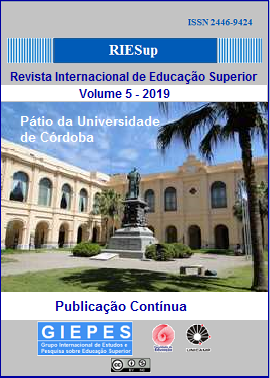Abstract
Celebrating the centennial of the University Reform that took place in Cordoba, Argentina, in 2018, we bring to the debate the importance of studying this experience of rebellion against the university hierarchy, while also highlighting its relevance, especially with regard to the need for democratization of the university and its connection to the working class and popular sectors. We aim to contribute to this experience being known by the vast majority of students in Brazil, also indicating its relevance to (re) construct a new student movement in na emancipatory perspective. For this, we carried out a historical-bibliographic review of what it proposed and what the reform meant in terms of autonomy and democratization, and which marked the birth of a new Latin American generation, causing subsequent agitation in other countries of the subcontinent. We emphasize that this experience evidences the active role of the student movement as a social actor in promoting social changes guided by an orientation inherent in the class struggle and in the concreteness of constructing a project that envisages a new hegemony in society. As conclusions, we highlight the relevance of the struggle for democratization and the objective of linking the university to the problems of society, fertile ground for the development of an emancipatory and popular education.
References
AGUIAR, Jórissa. Danilla. Os impactos da Revolução Russa no marxismo de J. C. Mariátegui. Tensões Mundiais, Fortaleza, v. 13, n. 24, p. 169-196, 2017.
FLORES GALINDO, Alberto. La agonia de Mariátegui. Lima: DESCO - Centro de Estudios y Promoción del Desarollo, 1980.
HAYA DE LA TORRE, Victor. Raúl. El Antimperialismo y el APRA. Lima: Publicação Oficial do APRA, 1985.
KAYSEL, André. Três Vozes, Duas Polêmicas e Um Problema: Mariátegui, Haya de La Torre, Julio Antonio Mella e as fundações do marxismo latino-americano. IV Seminário Discente da Pós-Graduação em Ciência Política da USP 2014. Disponível em: conferencias.fflch.usp.br/sdpscp/IVsem/paper/download/135/90.
KOHAN, Nestor.; De Inginieros al Che. Ensayos sobre el marxismo argentino y latinoamericano. Buenos Aires: Biblos; 2000.
LÖWY, Michael. O Marxismo na América Latina: uma antologia de 1909 aos dias atuais. 2ª. Edição. São Paulo: Editora Fundação Perseu Abramo, 2006.
MARIÁTEGUI, José Carlos. Por um socialismo indo-americano. Rio de Janeiro: Editora UFRJ, 2011.
MARIÁTEGUI, José Carlos. Sete ensaios de interpretação da realidade peruana. São Paulo: Expressão Popular, 2008.
MARX, Karl. Crítica à filosofia do direito de Hegel. Boitempo, São Paulo, 2005.
MANIFIESTO de la Federação Universitaria de Córdoba. [S.l.: s.n.], 1918. Disponível em: <http://www.reformadel18.unc.edu.ar/manifiesto.htm>. Acesso em: 12 jun. 2017.]
MOTA NETO, João. Paulo Freire e Orlando Fals Borda na genealogia da pedagogia decolonial latino-americana. Folios, 48, 3-13, 2018.
PORTANTIERO, Juan. Carlos., Estudiantes y política en América Latina. El proceso de la reforma universitaria (1918-1938). México: Siglo XXI; 1978.
REPÚBLICA ARGENTINA; Lei nº 8871 Eleitoral (Saenz Peña); Promulgada 26 de março de 1912.
ROMERO, Ricardo.; La lucha continua: el movimiento estudiantil argentino en el siglo XX. Buenos Aires: EUDEBA-FUBA; 1998.
UNIVERSIDADE NACIONAL DE CORDOBA. Manifesto Liminar. 1918 In https://www.unc.edu.ar/sobre-la-unc/manifiesto-liminar
A Revista Internacional de Educação Superior utiliza a licença do Creative Commons (CC), preservando assim, a integridade dos artigos em ambiente de acesso aberto.


